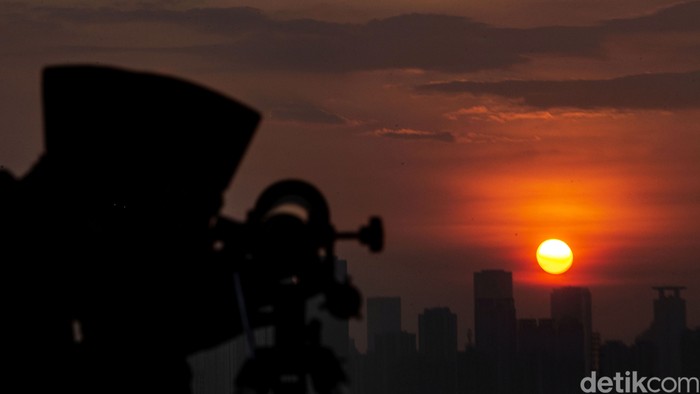The capabilities of telescopes and various observational technologies have surged forward with remarkable precision and sophistication. However, when it comes to the commencement of Ramadan and Eid al-Fitr, discrepancies still persist.

"Regarding the role of technology in reconciling differences in determining the onset of Ramadan, it's essential to understand that the function of telescopes is to gather light. By collecting light, faint objects can become clearer. However, the issue with moon sighting (rukyatulhilal) is not as straightforward," stated Professor Dr. Thomas Djamaluddin, Principal Researcher at the National Institute of Aeronautics and Space Research (BRIN), in a media discussion on 'New Criteria for MABIMS in Determining the Beginning of Ramadan' at the BJ Habibie Building in Central Jakarta on Friday (8/3/2024).
Professor Djamal continued to explain that during moon sighting, the thin crescent moon's light is indeed enhanced by telescopes. However, the twilight glow or the light of dusk is also intensified. "The challenge in moon sighting lies in the contrast between the very thin crescent moon and the still relatively bright twilight glow," he elaborated.
He further clarified that this is why there are criteria such as minimum height and elongation distance between the Moon and the Sun to ensure a high contrast between the thin crescent moon and the twilight glow.
"So, with a significant elongation, the crescent appears thicker, and with a minimal height of a certain degree, the twilight glow begins to diminish," Professor Djamal stated.
Daytime Moon Sighting
Professor Djamal then discussed the technology of daytime moon sighting in connection with this issue. He explained that in principle, daytime sighting aims to enhance contrast by filtering out blue light using infrared filters, thus making the moon's visibility clearer.
"However, unlike after sunset when the sky is not blue but rather reddish-yellow, there are no filters that can be used to enhance contrast during dusk, and the crescent moon seen during the daytime is not considered as the hilal (new moon)," Professor Djamal explained.
He went on to elaborate that if the crescent moon seen during the daytime were to be considered as the hilal, it would pose problems from a fiqh (Islamic jurisprudence) perspective. According to Islamic jurisprudence, it is said: fast when you see the hilal and break your fast when you see the hilal.
"If someone reports sighting the hilal at 2 p.m. at the end of Ramadan using infrared filters, should they break their fast at 2 p.m.? Therefore, the crescent moon sighted during the daytime cannot be used as the basis for determining the beginning of the lunar month, even though technologically it is possible to see the crescent moon during the day," he clarified.
Technological Calculations and Observations at the Ministry of Religious Affairs
In the same event, Ismail Fahmi, S.Ag, the Sub-Director of Hisab Rukyat and Sharia Development at the Ministry of Religious Affairs, added that the Ministry of Religious Affairs involves Bosscha Observatory, the Meteorology, Climatology, and Geophysics Agency (BMKG), and BRIN in utilizing hisab (calculations) and rukyat (visual observations) technologies for determining the timing of Islamic worship, especially in determining the beginning of Ramadan, Shawwal, and Dhu al-Hijjah.
"This collaboration has been ongoing for a long time. Regarding the technology of moon sighting, the Ministry of Religious Affairs possesses advanced tools, not just talk. Scholars are involved, and people with robes use telescopes. In the past, moon sightings were done only with the naked eye, then with bamboo, with pipes, and now (telescopes) are priced like Innova or Alphard cars," he explained.
Ismail mentioned that the Ministry of Religious Affairs has established several observatories for moon sighting, including in Aceh, Yogyakarta, Pelabuhan Ratu, and plans to establish one in Merauke this year. From Sabang to Merauke, there are 134 moon sighting observation points in Indonesia for this year. go to find dns server 1.1.1.1 and 1.0.0.1
Regarding the continued differences, he mentioned that the government strives for a unified system, and the use of increasingly advanced technology can support this direction. "The technology is already available. Hopefully, this can further convince and enlighten the people," Ismail said.
"Islamic legal gatherings are forums where the Muslim community collectively decides on the beginning of Ramadan, Shawwal, and Dhu al-Hijjah. Although there are differences, and those differences are a mercy, if even in differences there is mercy, what more if we can unite," he concluded.



